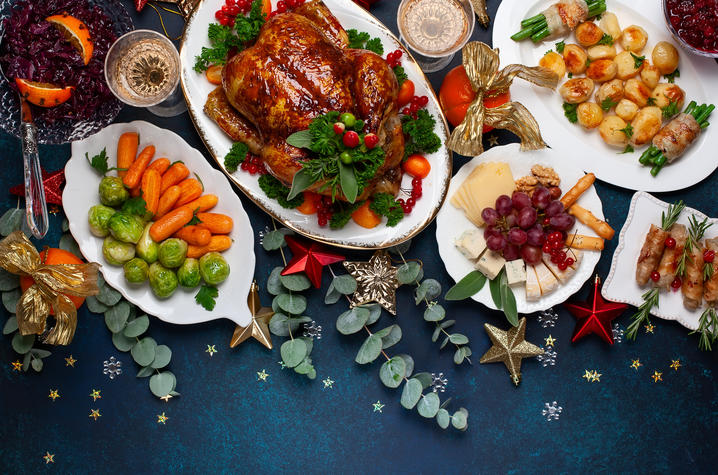Diabetes and Healthful Holiday Strategies

The University of Kentucky Public Relations & Strategic Communications Office provides a weekly health column available for use and reprint by news media. This week's column is by Laura Hieronymus, a doctor of nursing, master licensed diabetes educator and the associate director of education and quality services at the Barnstable Brown Diabetes Center and Daniel Stinnett a registered dietitian and master licensed diabetes educator in the Bluegrass Care Clinic.
LEXINGTON, Ky. (Dec. 7, 2020) — Americans savor winter holiday meals; however, not always in a good way. Statistics show the December holiday season is one of the top three in terms of food consumption with the average adult taking in about 3,000 calories in one meal. Additional calories throughout the day can add up to two and a half times what an average adult needs for their daily energy needs. When you have diabetes, the added intake can affect blood glucose levels and potentially lead to symptoms such as fatigue, sluggishness, and even weight gain. During the holiday season, an overabundance of foods is often the rule rather than the exception. The following strategies may be helpful as you navigate your food intake:
- Keep in mind that no one says you have to eat it all.
- When planning and preparing meals, less is better than more.
- Start a meal with a healthy snack such as raw vegetables and water to minimize hunger.
- When meal options are in front of you, do your best to make healthful choices.
- Pick and choose the foods that interest you the most.
- Add items to your plate in order of healthfulness selecting the healthiest foods first and least healthy foods last.
- Stay away from foods that tempt you to overeat.
- To lessen your chance of overindulging, chew slowly and enjoy the food’s flavor.
Holiday celebrations often include beverages with alcohol. If you choose to drink do so in moderation—generally considered no more than two drinks per day for men and one per day for women. Lighten up with lite beer, a wine spritzer, or calorie-free mixers. Avoid those specialty drinks such as Egg Nog (300+ calories), White Russian (4.5 ounces, 170+ calories), and 12 ounces of Christmas Ale (7.5% alcohol, 200+ calories) can be calorie-laden. Track your alcohol intake and avoid drinking on an empty stomach. If you become less attentive you will likely relax your focus on your overall calorie intake of food. Don’t drink and drive.
Remember you can always counterbalance those extra holiday calories by staying active. Walk some extra steps after you eat, participate in interactive games or dance to your favorite music.
Stay informed by monitoring your blood glucose to help you make better decisions. Tomorrow is another day, so if things don’t go as planned, learn from your experience and determine what you might do differently next time.
Above all, be safe and stay healthy. And, in the year of the 2020 pandemic do yourself and others a favor by staying socially distant, washing your hands, and wearing your mask. We all win.
As the state’s flagship, land-grant institution, the University of Kentucky exists to advance the Commonwealth. We do that by preparing the next generation of leaders — placing students at the heart of everything we do — and transforming the lives of Kentuckians through education, research and creative work, service and health care. We pride ourselves on being a catalyst for breakthroughs and a force for healing, a place where ingenuity unfolds. It's all made possible by our people — visionaries, disruptors and pioneers — who make up 200 academic programs, a $476.5 million research and development enterprise and a world-class medical center, all on one campus.
In 2022, UK was ranked by Forbes as one of the “Best Employers for New Grads” and named a “Diversity Champion” by INSIGHT into Diversity, a testament to our commitment to advance Kentucky and create a community of belonging for everyone. While our mission looks different in many ways than it did in 1865, the vision of service to our Commonwealth and the world remains the same. We are the University for Kentucky.




